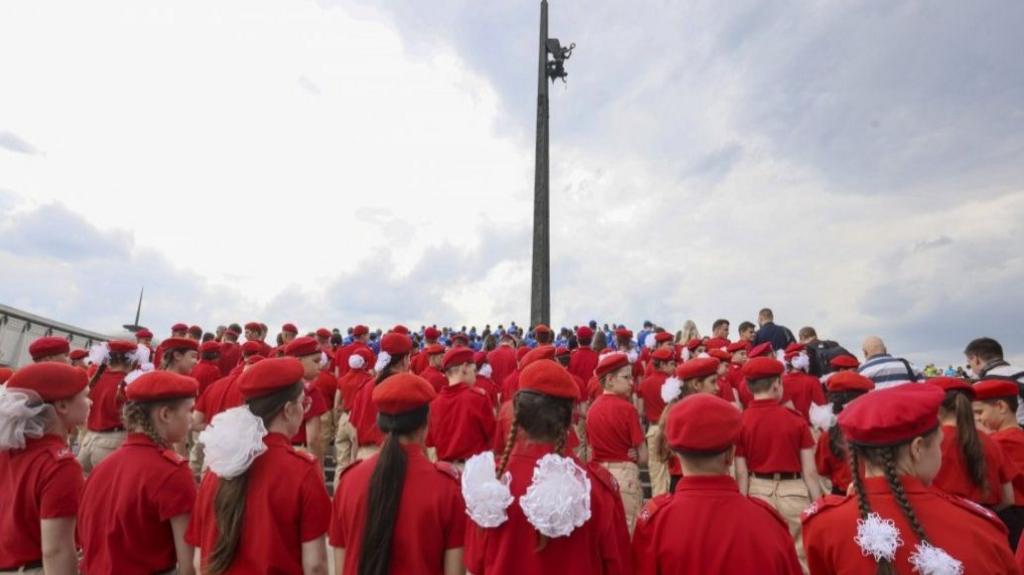In occupied eastern Ukraine, the indoctrination of children with pro-Russian sentiments begins at a young age.
At a nursery school in Luhansk, a group of over 70 children are seen holding a lengthy black and orange Russian military banner shaped like the letter Z, a symbol of Russia’s invasion of Ukraine.
Elsewhere in the city, seven young girls exuberantly dance and gesture in front of a Russian flag while the song “I am Russian” booms from loudspeakers. As the music concludes, they collectively shout, “I’m Russian.”
In the occupied town of Anthracite, nursery school children have been involved in making trench candles and blankets intended for Russian soldiers.
These instances are part of a broader campaign aimed not only at erasing Ukraine’s national identity but also at turning young Ukrainians against their own nation.
To implement this agenda with children, teachers are essential. With many Ukrainian teachers having fled, the Moscow government has initiated a program offering lump-sum payments of 2 million roubles (£18,500) to Russian educators willing to relocate to occupied regions of Ukraine.
The most prominent and influential Russian organization involved with children in these efforts is Yunarmia (Youth Army).
Affiliated with the Russian defence ministry, Yunarmia accepts members as young as eight years old. It operates throughout Russia and has now established branches in occupied areas of Ukraine.
“We are providing children with fundamental skills that could prove useful if they choose to join military service,” states Fidail Bikbulatov, who oversees Yunarmia’s operations in occupied areas of the Zaporizhzhia region in southeastern Ukraine.
Bikbulatov was deployed from Russia’s Bashkortostan, where he previously led the “Youth Guard” division of the ruling United Russia party.
The EU has imposed sanctions on Yunarmia and Bikbulatov personally for “the militarisation of Ukrainian children.” The UK has also sanctioned Yunarmia for its role in Russia’s campaign of “brainwashing” Ukrainian children.
Yunarmia is not the sole organization involved. Other Russian state-sponsored groups that have moved into the occupied territories include “Movement of the First Ones” and “Warrior,” a network of centers for “military and athletic training and patriotic education of young people,” established under the orders of Russian President Vladimir Putin.
These groups organize competitions like the Zarnitsa games, rooted in the Soviet era, where Ukrainian children are required to demonstrate “general military literacy, knowledge of Russian statehood and military history, and firearms firing skills.”
As children progress through the education system, they are taught in Russian, following the Russian curriculum and using textbooks that legitimize Russia’s war against Ukraine.
One such textbook depicts Ukraine as a Western construct designed to antagonize Russia, suggesting that human civilization might have ended had Russia not invaded Ukraine in 2022.
Lisa, who attended a school in occupied Donetsk, recounts that students were compelled to participate in events celebrating Russia and the USSR.
“When they were preparing for some kind of parade, my entire class and year group were forced to attend training every weekend. We had to hold posters. I couldn’t refuse; it wasn’t my choice. I was told I had to do it to graduate,” Lisa explains.
“Every lesson began with our teacher making us stand up, put our hands on our hearts, and listen to the Russian anthem, which she also made us memorize.”
Lisa now resides in the US and shares her experiences on TikTok.
Serving Russian soldiers also participate in the indoctrination campaign, visiting schools to conduct “bravery lessons.” They glorify their wartime exploits and portray Ukrainian forces as violent, unruly neo-Nazis.
Pavel Tropkin, an official from the ruling United Russia party now based in the occupied part of the Kherson region, states that these lessons are held “so that children understand the objectives” of what the Kremlin refers to as “the special military operation” in Ukraine.
Beyond the classroom, Ukrainian children are taken to specially organized exhibitions that celebrate Russia and the “special military operation.”
One center facilitating such trips hosts exhibitions titled “Russia – My History” and “Special Military Operation Heroes” in Melitopol, in the Zaporizhzhia region.
These excursions extend further.
The Kremlin has also launched a significant campaign to take Ukrainian children on tours of Russia in an effort to instill pro-Russian sentiments.
Russia’s culture minister, Olga Lyubimova, claims that over 20,000 children from occupied Ukrainian territories have been taken to Russia under a single program called “4+85.” According to Rosconcert, the Russian government’s concert agency that runs the program, its aim is to “integrate the new generation into a unified Russian society.”
However, Russia’s “integration” campaign extends beyond indoctrination.
Thousands of Ukrainian children taken to Russia during the three years of the full-scale invasion have not been permitted to return.
According to the Ukrainian government, over 19,000 Ukrainian children have been forcibly deported to Russia. The UK government estimates that approximately 6,000 Ukrainian children have been relocated to a network of “re-education camps” in Russia.
International humanitarian law prohibits such activities. For instance, the Fourth Geneva Convention stipulates that an occupying power may not enlist children “in formations or organizations subordinate to it” and may not apply “pressure or propaganda aimed at securing voluntary enlistment” of locals in occupied areas into its armed or auxiliary forces.
In 2023, the ICC issued an arrest warrant for President Putin, partly for the unlawful deportation of children. Putin and his government deny these charges.
In its war on Ukraine, Russia is not only pursuing territory but also attempting to impose its influence on the people who reside there, regardless of their age.
The show featuring boards with photographs is touring libraries across North Yorkshire.
Children aged from six to 12 attend lessons at the school on Saturdays to learn about their home.
For the past three years carpenter Matt has been distributing aid to the city of Sumy.
Three Russian intelligence units and 18 officers have been sanctioned, the Foreign Office says.
The scheme allows Ukrainian troops to trade videos of confirmed kills on the battlefield for prizes.

